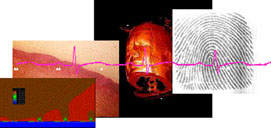
Center for Identification Technology Research (CITeR)
West Virginia University
A National Science Foundation Industry/University Cooperative Research Center since 2001
Partner Institutions:
- Marshall University
- Michigan State University
- San Jose State University
Automated biometric identification is an enabling technology for information assurance
Center Mission and Rationale
As embedded computing and communications become pervasive, ensuring information through means other than faceless logins becomes essential for access control, banking, internet/computer security, and a wide range of e-commerce and information systems.
Automated biometric systems for human identification measure a "signature" of the human body, compare the resulting characteristic to a database, and render an application-dependent decision. These biometric systems for personal authentication and identification are based upon physiological or behavioral features that are typically distinctive but varying, such as fingerprints, hand geometry, face, voice, lip movement, gait, and iris patterns. In a broader application context, biometric systems measure a biological signature from the body or environment. These systems are having a revolutionary impact on health care, forensics, and public health, enabling in vivo identification of specific human conditions via implantable devices, the automated administration of life-saving medical therapies, and automated rapid pathogen detection. Biometrics for such biomedical, human computer interface, and biological agent applications will extend to a wide range of physiological and molecular signatures.
Effectively addressing the breadth of current and emerging biometric identification system research from the life and health sciences to the computing sciences represents a significant challenge to industry and government. CITeR was established in order to serve the needs of its members by advancing the technology and performance of biometric systems. The main objectives of the Center are to:
- Conduct basic, cross-cutting research of new enabling technologies and related developmental activities for the assessment and use of automated biometric systems
- Provide timely and effective technology transfer of new biometrics technology to the private and government sectors through its membership
- Promote interdisciplinary training of scientists and engineers through its biometrics research.

|
Research Program
Faculties at four universities are participants in the Center and provide its fundamental capabilities. Faculty and students from the departments of Computer Science and Electrical Engineering, Mechanical Engineering, Pharmacy, Physics, and Statistics at West Virginia University (WVU); Information System Engineering, Chemistry, and Microbiology at Marshall University (MU); Computer Science and Engineering at Michigan State University (MSU); and the Biometric Test Center at the College of Engineering at San Jose State University (SJSU) all conduct research for CITeR. The faculty and universities involved represent a set of core competencies necessary to support a research and activity portfolio for the Center spanning four major technical areas at the foundation of biometric identification systems - biometric sensors systems and analysis, signal/image processing and pattern recognition, statistical performance and analysis, and information assurance. In addition, the Center is evaluating extension of its activities into the important area of sociological acceptance of these systems.
The Center has exceptional laboratory facilities and equipment to use as it addresses research topics across this interdisciplinary spectrum. These include:
- The Pattern Recognition and Image Processing Laboratory (MSU)
- DNA Analysis Laboratory (MU)
- The National Biometrics Test Center (SJSU)
- Statistical Survey Center (WVU)
- The modeling and molecular synthesis facilities in the Computational Chemistry and Molecular Modeling Group (WVU)
- Sensor materials and device modeling, fabrication, and characterization labs of the Photonic and Microelectronic Technologies Group (WVU)
- Biosignal Analysis Laboratory (WVU)
- Data visualization capabilities of the Virtual Environments Laboratory (WVU)
- Software Architectures and HPC Laboratory (WVU).
Special Center Activities
As a newly established Center, CITeR is developing a wide range of activities as an added value to its membership and to strengthen the foundation for biometrics education and research. Highlights of current and planned CITeR activities include:
- Stimulating multidisciplinary, multi-P.I. research projects spanning the core areas of biometric systems
- Enlisting 16 faculty spanning nine departments at four universities
- Facilitating a multidisciplinary graduate research program with masters, doctoral, and post-doctoral student participation
- Providing research opportunities leading to Ph.D. and M.S. degrees
- Developing research opportunities for undergraduates through NSF Summer Research Experiences for Undergraduates Program opportunities and Center projects
- Developing new courses in the area of Biometrics and Information Assurance
- Interacting with the Software Engineering Research Center (SERC) I/UCRC and other I/UCRCs via TIE projects
- Closely interacting and collaborating with the Biometrics Consortium and industry working groups.
Center Headquarters
Center for Identification Technology Research
Department of Computer Science and Electrical Engineering
West Virginia University
Morgantown, West Virginia 26506-6109
Tel (304) 293 0405 * Fax (304) 293-8602
Homepage: www.csee.wvu.edu/citer/
Center Director: Larry Hornak
(304) 293-0405 * lah@csee.wvu.edu
Center Evaluator: Dr. Timothy Pearson, CPA
(304) 293-7847 * TAPearson@mail.wvu.edu
NSF 01-168uu